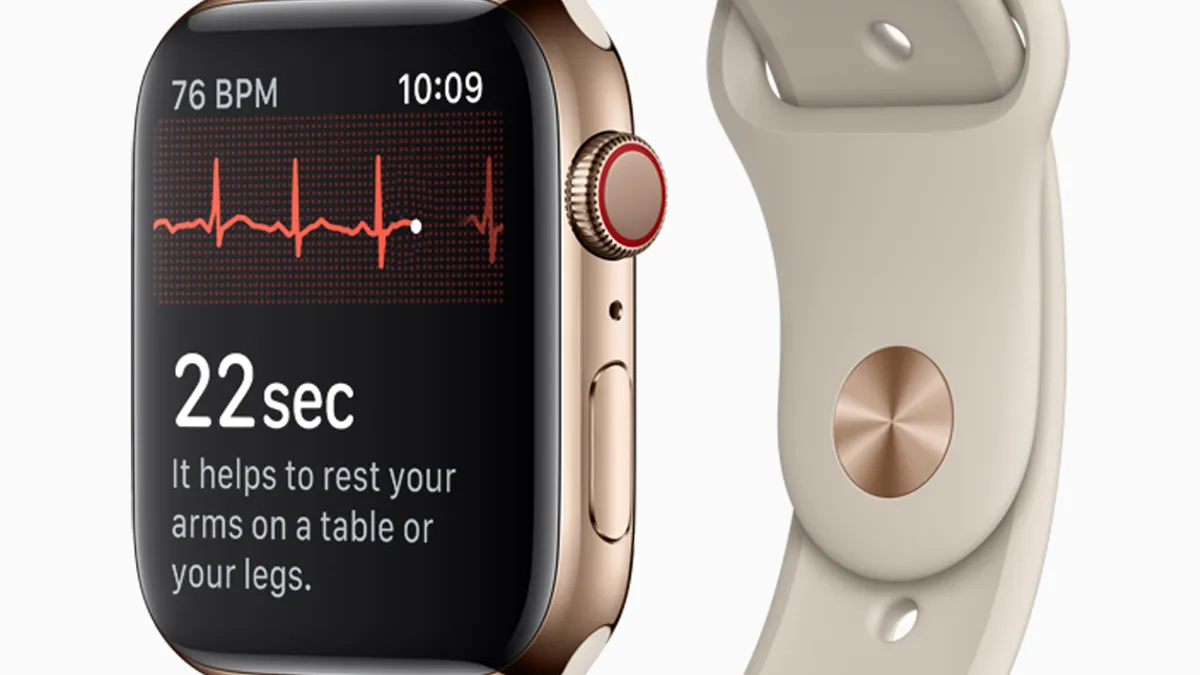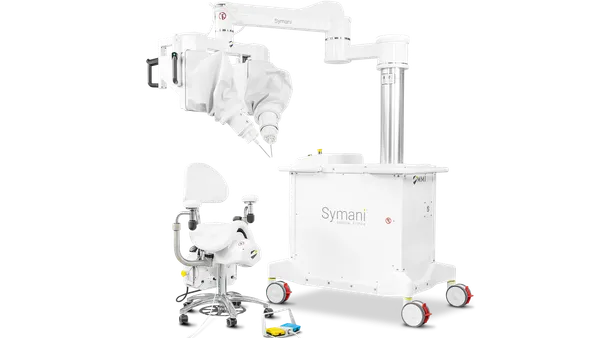Dive Brief:
- Preliminary results in a study of Apple Watch to track heart data found 0.5%, or 2,161 people, received notifications of a potential irregular heartbeat and a recommendation to schedule a telehealth visit with a doctor. The prospective, single-arm observation trial tracked 419,297 participants to see if the watch's irregular pulse notification feature could identify atrial fibrillation or flutter.
- 945 individuals took part in the telehealth screen from American Well, where the doctor checked for emergency situations. Following the screen, 658 participants then had an EKG patch mailed to them, and 450 used the patch to simultaneously monitor for atrial fibrillation.
- The study, conducted by Stanford University researchers with funding from Apple, found only 34% of those who received an irregular pulse notification had the EKG patch confirm the condition when it was received and worn a week later. But notifications from the Apple Watch when also wearing the EKG patch matched 84% of the time.
Dive Insight:
The low rate of notifications is one positive of the study, according to cardiologists, researchers and Apple. But Ethan Weiss, a cardiologist at the University of California, San Francisco told MedTech Dive the study was "a little bit of a gimmick and ultimately we will have to look at if this improves outcomes."
"We’ve known about this study for a while. The expectations for it were close to zero, and we learned close to zero," Weiss said. "[The low number of notifications] are one positive for sure. People were worried about it."
While the study has limitations, it will serve as a footprint in how to conduct scalable research to evaluate technologies in the future, Mintu Turakhia, one principal investigator of the study and an associate professor of cardiovascular medicine at Stanford, told doctors at the American College of Cardiology.
He said the study was not meant to determine outcomes and argued the results will be a data point for physicians to consider in the context of other risk factors on an individual basis.
"We think this is going to inform some of the other studies," Turakhia told reporters.
Matthew Martinez, a cardiologist at Lehigh Valley Hospital, said at a press conference that the study shows a good proof of concept of an early signal for atrial fibrillation, but additional research is needed into outcomes data. He noted that anticoagulant drugs are not benign and carry side effects.
"There are risks. The fear we all have can be summarized by the word ‘over’ – overload of information, overdiagnosis, overtreatment and overanxiety. But I was surprised to hear the only 0.5% notification, I certainly hear from more of my patients that are wearing ambulatory monitoring," Martinez said.
In January, Johnson & Johnson announced its subsidy Janssen Pharmaceuticals will be conducting a pragmatic randomized controlled research study for individuals age 65 years or older to examine outcomes of the Apple irregular rhythm notifications and ECG app in diagnosing atrial fibrillation and stroke prevention.
The Apple Heart Study provides a starting point, but raises unanswered questions and does not change the practice of medicine, Andrew Kates, a cardiologist at Washington University in St. Louis and chair of the ACC Annual Scientific Session, told MedTech Dive.
"34%, is that a good number to diagnose, or is it a low amount? We don't know the answer to that yet," Kates said. "I think the fact that there weren’t a large number of patients that were misdiagnosed was encouraging, but we still need to learn more."
Notably, of the 787 individuals in the study that contacted a non-study provider, 28% started a new medication, 262 were referred to a specialist and 36% underwent additional testing. There were zero serious adverse events and 16 non-serious adverse events attributed to the application.
The study examined Apple’s Irregular Rhythm Notification Feature, which received a De Novo clearance from FDA in September. The application is not intended for those under 22 years of age or for those previously diagnosed with atrial fibrillation. FDA also notes it is "not intended to replace traditional methods of diagnosis or treatment."
The application is currently available on Apple Watches with watchOS 5.1.2 or higher, and is separate from the single-lead electrocardiogram monitor embedded in the company’s latest Apple Watch. It notifies users if it detects five out of six measurements over a 45-minute period registering as an irregular heart rhythm.
One concern about the study design is that Apple Watch owners may not be representative of a broader population. Of those in the study, 38% were obese, 21% had hypertension and 5% had diabetes. It also skewed young, white and male: 52% were between 22- and 39 years old, 68% were white and 58% were male.
But Turakhia noted that only 0.16% of those between the ages 22-39 received an irregular rhythm notification, a number he said reflects positively for the application.












